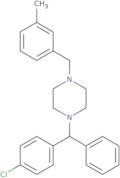Informations sur le produit
- (.+-.)-Meclizine
- 1-(p-Chloro-α-phenylbenzyl)-4-(m-methylbenzyl) piperazine
- 1-(p-Chlorobenzhydryl)-4-(m-methylbenzyl)diethylenediamine
- 1-(p-Chlorobenzhydryl)-4-(m-methylbenzyl)piperazine
- 1-(p-Chlorobenzohydryl)-4-(m-methylbenzyl) piperazine
- 1-[(4-Chlorophenyl)-phenylmethyl]-4-[(3-methylphenyl)methyl]piperazine hydrate
- 1-[(4-Chlorophenyl)phenylmethyl]-4-[(3-methylphenyl)methyl]piperazine
- Ancolan
- Bonine
- Histametizyne
- Voir d'autres synonymes
- Meclozin
- Meclozina
- Navicalm
- Neo-Istafene
- Nsc 169189
- Parachloramine
- Piperazine, 1-(p-chloro-α-phenylbenzyl)-4-(m-methylbenzyl)-
- Postafene
- Ravelon
- Sabari
- Suprimal
- U.C.B. 5062
- Vomisseis
- Piperazine, 1-[(4-chlorophenyl)phenylmethyl]-4-[(3-methylphenyl)methyl]-
Meclozine is a nonsteroidal anti-inflammatory drug used to treat pain, stiffness and swelling in adults. It is also used to relieve the symptoms of hay fever, such as sneezing, runny nose, and itchy or watery eyes. Meclozine is available as tablets, capsules or oral solution. The recommended dosage for adults is 25 mg three times per day. Meclozine should not be taken by patients with severe liver disease. This drug may cause drowsiness and dizziness. Women who are pregnant or breast-feeding should not take this medication unless advised to do so by their doctor.
The use of meclozine has been associated with an increased risk of cardiovascular events in elderly patients with dementia and Alzheimer's disease (AD). In addition, meclozine has been shown to have a negative impact on energy metabolism in the body due to its effect on thyroid hormone levels.





